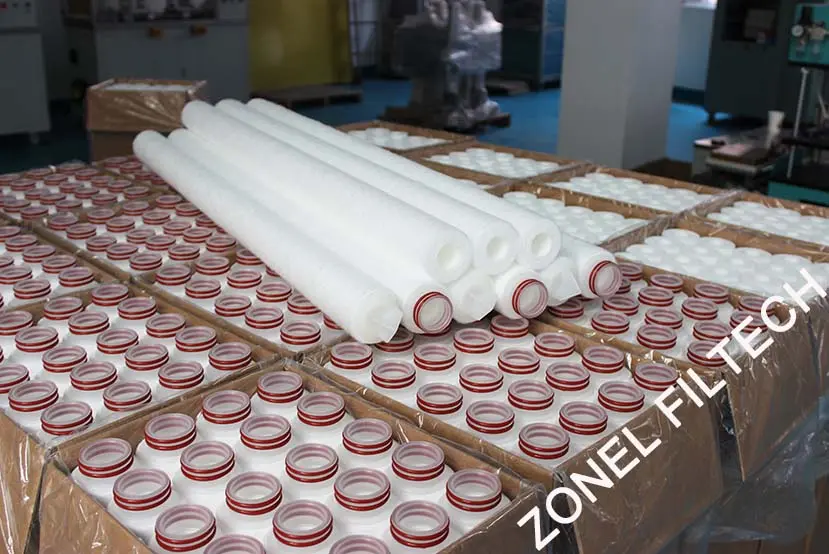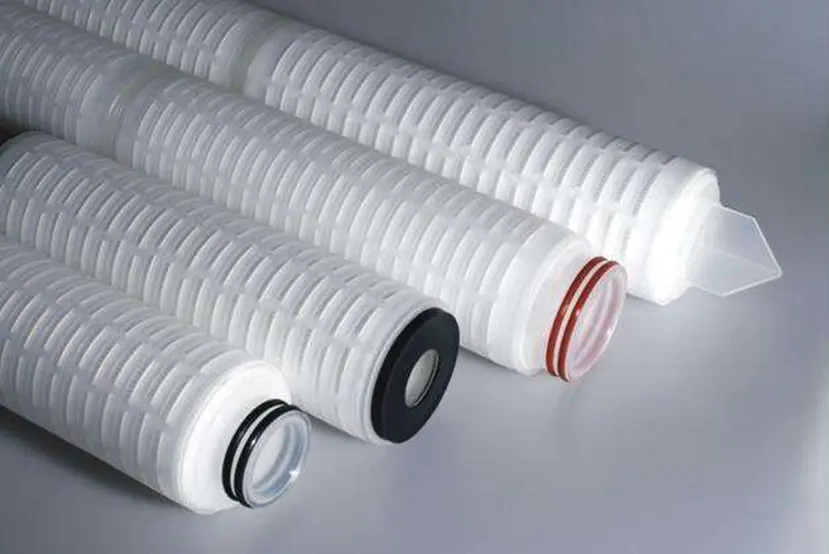In the dynamic world of industrial filtration, polypropylene (PP) melt-blown filter cartridges have carved out a reputation as a groundbreaking solution. Renowned for their outstanding efficiency and dependability, these cartridges are becoming vital in numerous industries. This comprehensive article delves into the defining characteristics, working principles, advantages, and applications of PP melt-blown filter cartridges, offering valuable insights into selecting, installing, and maintaining these crucial components. 
Table of Contents
ToggleDefinition
A polypropylene (PP) melt-blown filter cartridge is a type of depth filter constructed from fine polypropylene fibers. These fibers are created through a melt-blowing process, wherein polypropylene polymer is melted and extruded through small nozzles. High-speed air then blows the molten polymer, forming fine fibers that accumulate on a collector surface. The fibers bond together randomly, creating a porous structure that acts as an effective filter medium. These cartridges are widely used for filtering out contaminants from liquids and gases in numerous industrial applications.
Operating Principle
The operating principle of PP melt blown filter cartridges is based on depth filtration. Unlike surface filters that capture particles on their outer surface, depth filters trap contaminants throughout the entire thickness of the filter medium. As the fluid passes through the cartridge, particles are intercepted and retained within the intricate matrix of fibers. This structure, with fibers of varying diameters, creates a gradient density that enhances filtration efficiency by capturing particles of different sizes, from large debris to microscopic contaminants.
Advantages
PP melt-blown filter cartridges offer a multitude of benefits, making them a preferred choice in various industrial settings: High Filtration Efficiency: The gradient density structure allows for effective particle retention, ensuring cleaner and purer output. Chemical Resistance: Polypropylene withstands a broad spectrum of chemicals, allowing these cartridges to operate efficiently in challenging environments. Cost-Effectiveness: The production process and materials used in these cartridges result in a cost-efficient filtration solution without sacrificing performance. Low-Pressure Drop: The porous nature of the filter medium facilitates high flow rates with minimal pressure drop, enhancing operational efficiency and reducing energy costs. Versatility: Offered in a range of sizes, micron ratings, and configurations, PP melt-blown cartridges can be customized to suit specific filtration needs across various industries. Thermal Stability: Polypropylene can withstand significant temperature variations, making these cartridges suitable for both high and low-temperature applications.
Industrial Uses
PP melt-blown filter cartridges are essential for numerous industrial applications because of their versatility and efficiency. Some of the key applications include: Water Treatment: These cartridges are used extensively in municipal and industrial water treatment plants to remove sediments, rust, and other particulates, ensuring a clean and safe water supply. Food and Beverage Industry: In the food and beverage sector, PP melt-blown cartridges are essential for filtering out impurities during the production process, helping to maintain high hygiene and safety standards. Pharmaceuticals and Biotechnology: These cartridges are crucial in ensuring the purity of water and other solvents used in the production of pharmaceuticals and biotechnological products, thereby preventing contamination and ensuring product quality. Chemical Processing: PP melt-blown cartridges are employed to filter aggressive chemicals and solvents, protecting equipment and ensuring the quality of the end products in chemical processing industries. Oil and Gas: In the oil and gas sector, these cartridges are used in refining processes to remove contaminants from crude oil and other hydrocarbons, ensuring smooth operation and high-quality outputs. Electronics Manufacturing: Utilized to purify water and chemicals during the production of electronic components, ensuring the accuracy and reliability of the finished products.
How to Choose the Appropriate Products
Selecting the right PP melt-blown filter cartridge is crucial for optimal performance. Here are some factors to consider: Micron Rating: Determine the size of the particles that need to be filtered and select a cartridge with the appropriate micron rating. Finer ratings are suitable for capturing smaller particles, while coarser ratings are better for larger debris. Flow Rate: Confirm that the cartridge can manage the needed flow rate without inducing excessive pressure drop. This is vital for preserving system efficiency and avoiding operational disruptions. Chemical Compatibility: Verify that the polypropylene material is compatible with the chemicals and fluids being filtered to prevent degradation and ensure the longevity of the cartridge. Cartridge Size: Choose the correct cartridge size based on the filter housing dimensions and the volume of fluid to be processed. A proper fit is crucial for effective filtration. Application Requirements: Consider any specific application needs, such as temperature resistance, regulatory standards, and industry-specific guidelines, to ensure the chosen cartridge meets all necessary criteria.
Installation and Maintenance
Correct installation and maintenance are critical for extending the lifespan and optimizing the performance of PP melt-blown filter cartridges. Here are some best practices: Installation: Comply with the manufacturer’s installation instructions. Verify that the filter housing is clean and debris-free before inserting the cartridge. Properly seat the cartridge to avoid bypass and ensure a secure seal. Initial Flush: After installation, it’s important to flush the system to remove any loose fibers or manufacturing residues. This step is crucial to maintaining the purity of the filtered fluid. Regular Monitoring: Periodically check the differential pressure across the filter to monitor its performance. An increase in pressure drop indicates clogging and the need for replacement. Planned Replacement: Timely replacement prevents performance degradation and potential system damage. Proper Disposal: Dispose of used cartridges according to local regulations and environmental guidelines, ensuring responsible and sustainable practices. 
Conclusión
Polypropylene melt-blown filter cartridges are poised to become the future of industrial filtration solutions. Their combination of high efficiency, chemical resistance, and cost-effectiveness makes them an invaluable asset across a wide range of industries. By understanding their working principles, advantages, and selection criteria, businesses can optimize their filtration systems for enhanced performance and reliability. Correct installation and maintenance additionally guarantee the longevity and effectiveness of these essential filtration components.
